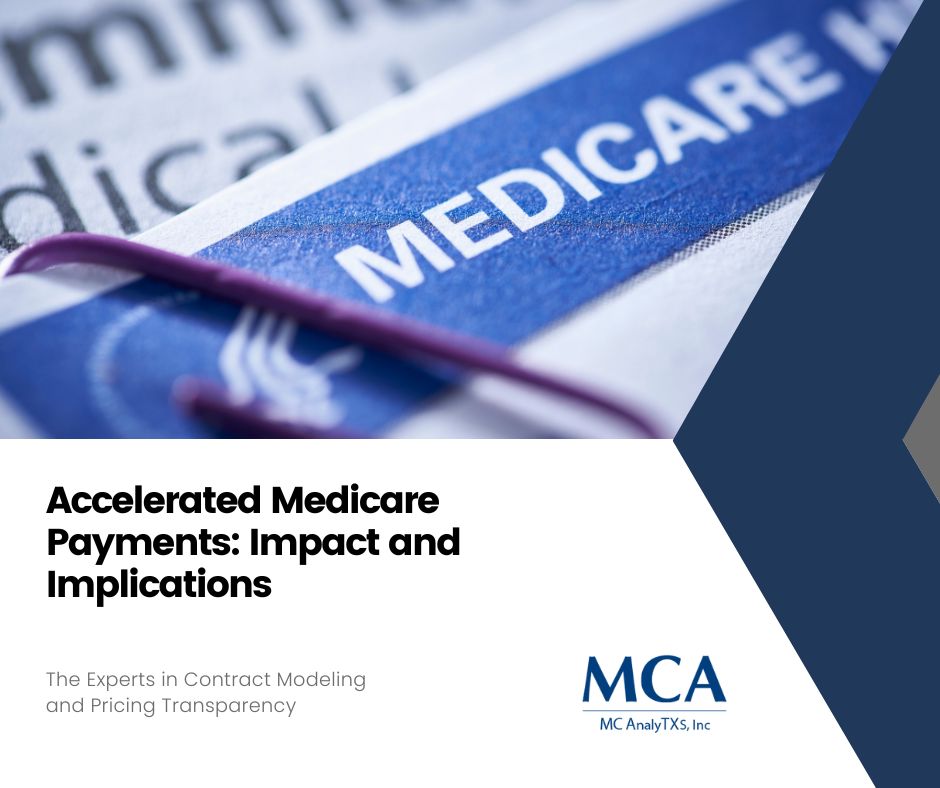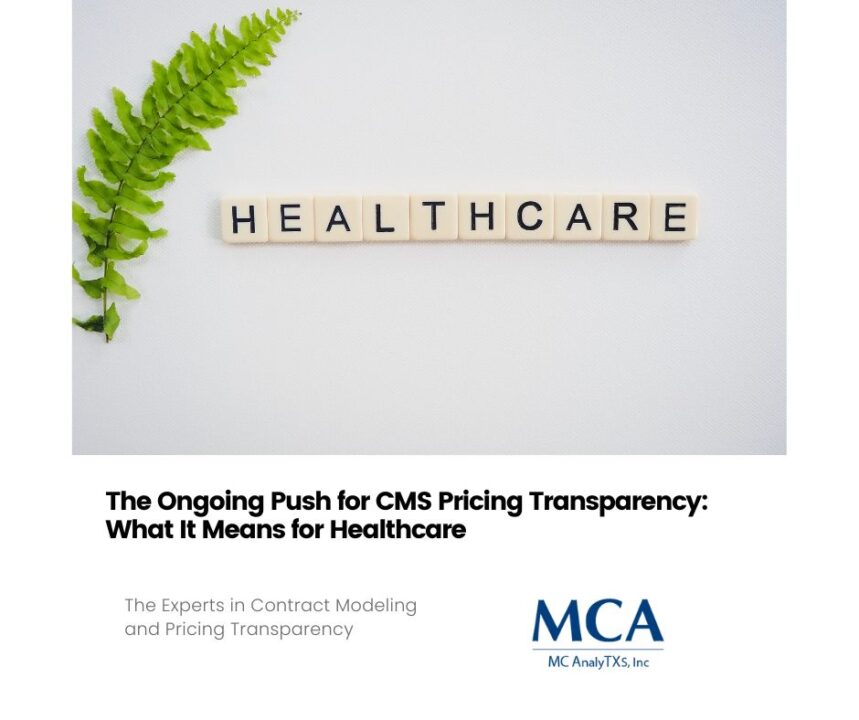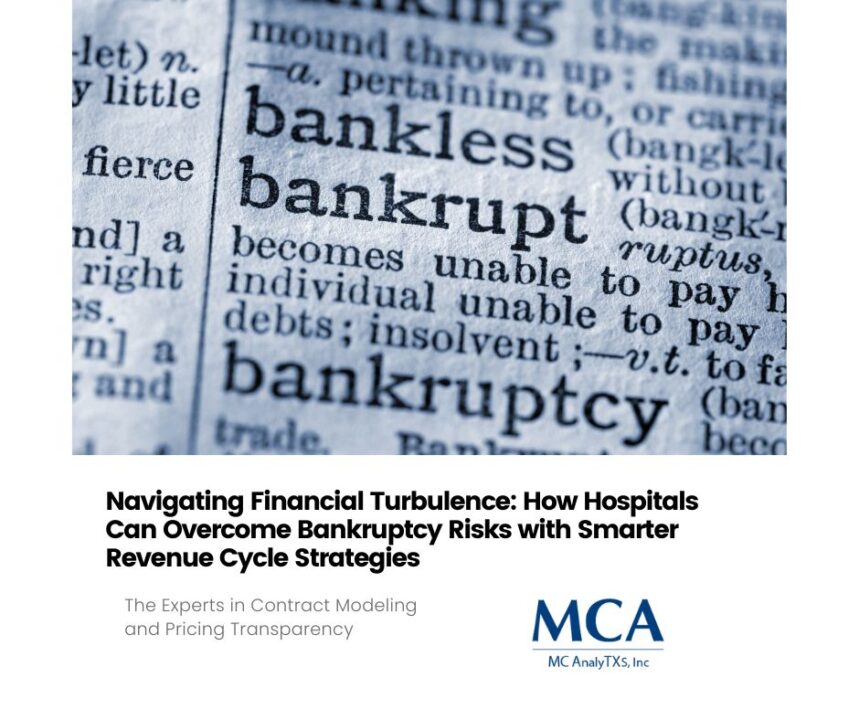
The Imperative of Claim Management & Contract Modeling Software in Revenue Cycle Management
March 8, 2024
Understanding President Biden’s Healthcare Budget Proposal
March 13, 2024The healthcare industry is often at the forefront of economic shifts, and the recent acceleration in Medicare payments by the Centers for Medicare & Medicaid Services (CMS) is a prime example of an agile response to a challenging period of uncertainty. With CMS announcing rapid payments to Part A providers and Part B suppliers on March 9, and the subsequent advice for Medicare Advantage and Part D organizations to follow suit, the seismic ripples of this change are felt by all entities involved in healthcare delivery. In this blog, we’re unraveling the tapestry of accelerated Medicare payments and discerning the impact this strategy holds for healthcare providers and the broader health policy landscape.
Why Accelerated Payments Matter
In a bid to bolster the healthcare system during the COVID-19 pandemic, CMS has enacted this accelerated payment plan to provide much-needed financial flexibility to providers across the board. The initiative holds particular significance for Part A and Part B stakeholders, functioning as a vital support structure during times of operational disruption.
Importance for Part A and Part B
Part A providers, such as hospitals, are pivotal in delivering acute care services, and the swift influx of funds can protect their capacity to treat patients effectively. It’s a lifeline for providers who are dealing with increased demand and unexpected expenses due to the pandemic.
On the other hand, Part B suppliers, including medical equipment companies and other auxiliary services, also stand to benefit from these accelerated payments that can help them maintain critical supply chains and sustain service operations.
Encouragement for Medicare Advantage and Part D
Acknowledging the broader impact on the entire care continuum, CMS’s push for accelerated payments from Medicare Advantage and Part D plans reflects a system-wide recognition of the financial vulnerabilities many players currently face. By reinforcing the financial health of insurance plans, the trickle-down effect aims to maintain stability throughout the care ecosystem.
Key Points to Know
Accelerated payments are an advanced implementation of the Medicare program designed to get funds into the hands of providers and suppliers more quickly than traditional billing cycles allow.
Explaining Accelerated Payments
CMS is offering expedited payments based on historical Medicare billing amounts to alleviate the cash flow strains providers might experience. These are not additional funds, but an advance on anticipated claims reimbursement.
The process typically involves a request from the provider, followed by CMS review and approval, and an approved amount processed and paid within seven days. However, providers also need to be aware of the obligations and repayment schedules associated with these accelerated payments.
Benefits and Challenges
The benefits are immediate and clear — providers receive funding within days, ensuring they can address financial pressures without undue delay. However, there are challenges to consider, such as potential overpayments and the strategic implications of financial planning. Opting for accelerated payments is a trade-off, offering short-term relief but requiring thoughtful repayment structuring.
Implications for Healthcare Providers
The operational and financial implications for healthcare providers cannot be overstated. This change in payment dynamics has spurred a paradigm shift that necessitates a reassessment of business models and operational capabilities.
Operational Impact
The agility to respond to the healthcare needs of patients during a pandemic depends on financial resources, and accelerated payments provide a tactical advantage in managing daily operations and creating surge capacity.
Providers must now evaluate the scale and extent of remote care delivery options, reassess staffing models, and deploy resources where they are most critical. Flexible modes of operation will be key to managing the inflow of accelerated payments effectively.
Financial Considerations
While providers welcome the expedited funds, it is imperative to plan for their strategic allocation. Setting aside the advance payments to cover future Medicare claims and ensuring compliance with unique reporting requirements are vital fiscal management steps.
Additionally, the potential for overpayments necessitates comprehensive tracking and auditing. Providers need to maintain meticulous records to ensure accurate reconciliations when claims are ultimately settled, preventing any adverse financial implications.
Insights for Health Policy Analysts
The CMS’s move to accelerate Medicare payments has far-reaching implications for healthcare policy. Analysts must now grapple with the long-term effects of this operational pivot and its impact on the broader health ecosystem.
Policy Implications
The policy arena is likely to witness robust discussions on the broader application of accelerated payments beyond the immediate pandemic response. Will this approach become a staple in CMS’s toolkit for supporting providers during emergencies?
Questions over the sustainability of accelerated payments and their alignment with broader health policy objectives will arise. How does this new financial flow affect initiatives to shift towards value-based care or the move to reduce administrative burdens in healthcare billing?
Future Trends in Healthcare Payment Acceleration
Expect the topic of payment acceleration to be a point of ongoing debate. Will private payers follow CMS’s lead, or will the concept be reined in by policy developments aimed at achieving financial equilibrium in healthcare spending?
Health policy experts will need to monitor and forecast the trends in payment acceleration, both as an aid to immediate crisis management and as a method for fostering innovation and resilience in the healthcare marketplace.
Conclusion
The acceleration of Medicare payments is not merely a transactional shift in billing procedures; it represents a dynamic response to an unprecedented healthcare challenge. It impacts providers, suppliers, payers, and analysts alike, influencing workflows, operations, and long-term strategic planning.
It is crucial for all stakeholders to stay abreast of CMS directives and industry standards, not just for conformity’s sake but for harnessing the full potential of these accelerated payments. As the healthcare landscape continues to evolve, agility in financial management will be a defining factor for success.
In navigating these uncharted waters, the call to action is clear: adapt to the changes in Medicare payments with foresight and innovation. Combining these elements with a commitment to patient-centric care can lead to sustainable solutions that endure beyond the current crisis. The mandate, therefore, is twofold — understanding the present implications and shaping a future that is responsive and resilient.
For firsthand insights and guidance on navigating the complexities of Medicare payments, providers and analysts are encouraged to connect with industry peers and leverage professional networks. Only through collective expertise and shared learning can the healthcare community address the immediate challenges and prepare for an adaptable future in healthcare delivery.
Stay informed, stay connected, and above all, stay committed to the mission of healthcare — your community and patients rely on your steadfast leadership in these uncertain times.





